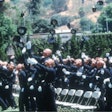This is for the Field Training Officers (FTOs) and academy staff members who have run out of examples or have no imagination. I recall my academy experiences (Yes, more than one: military, federal, and civilian). All three had the same words ringing in my ears: "If you do this or that you will get killed."
I have heard this statement millions of times. Every officer has. It becomes meaningless to us all when it is overused.
Reality Statement
I guess instructors want to play on our fears, fear of dying or the unknown. But has this ultimate demise lost its impact?
I had a recruit not long ago standing outside of the academy cafeteria mumbling. I asked him what the issue was, and he replied that he had forgotten his lunch that day so he guessed he would "get killed."
I was taken aback by his words and pressed the conversation. He told me that in his class everything that they do wrong will get them killed according to academy staff. I told the recruit the instructors were trying to drive home a point, but the student still allowed this to eat away at him.
What is wrong with this scenario? The consequences given by staff often were catastrophic rather than realistic. Not everything a recruit does will get him or others killed. Some mistakes could instead cause a recruit to lose a case in court, get injured, get suspended, get sued, or whatever.
Make sure the consequence you warn of fits the task at hand. Not all are terminal. Each recruit has his or her own bugaboo that makes him or her tick. Each has individual fears, so make your teaching points realistic to focus on those fears.
For example, most recruits have a fear of court. An error on a report could result in a case being lost and a perp walking free. This is a realistic consequence. A misspelled word will not result in death.
Make it Resonate
Running around shouting at recruits about getting killed is pointless, for sooner or later they will tune it out, just as the lunch-less student had. If you are striving to get an idea across, do so with relevant teaching points. Once the students tune out your examples, you are not training them, you're just exhaling with words.
One of my favorite sergeants had a way of making you think. If a recruit made a tactical error he would ask a question: "What is your favorite color?"
"Why?" the recruit would reply.
"So when you do this again and get shot or hurt I will know what color of flowers to bring to the hospital."
This made a point, and it didn't involve screaming.
This same sergeant knew the stories of the fallen officers named on my past department's memorial. More than once he asked an officer to go by the monument, which was out in front of the barracks (headquarters). There he would give the historical story of what happened to the officer.
Yes, it was a teaching point, and it told of a fatal outcome. But the difference was he was telling a relevant story to get the idea across. No yelling, just the story. And then he'd ask you how you could keep your name off the monument.
This was an excellent method to promote thinking safety and tactics. I highly recommend such techniques. Unlike repeating like a broken record, "You will get killed," making a recruit think hard about what he or she is doing might actually be effective in preventing a death.
Study, train, and apply yourself; they make the difference.


















